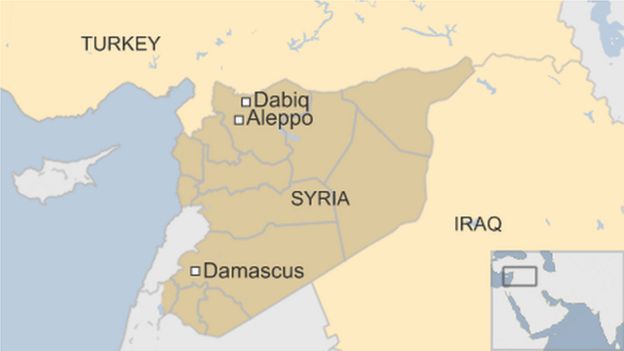Dabiq, which lies about 10km (6 miles) from the border with Turkey, features in Islamic apocalyptic prophecies as the site of an end-of-times showdown between Muslims and their “Roman” enemies.
The Prophet Muhammad is believed to have said that “the last hour will not come” until Muslims vanquished the Romans at “Dabiq or al-Amaq” – both in the Syria-Turkey border region – on their way to conquer Constantinople (modern-day Istanbul). More here from BBC.
Statement by Secretary of Defense Ash Carter on the Liberation of Dabiq
I welcome today’s news that Syrian opposition forces liberated the Syrian town of Dabiq from ISIL control, aided by strong support from our ally Turkey and our international coalition. This is more than just the latest military result against this barbaric group. Dabiq held symbolic importance to ISIL. The group carried out unspeakable atrocities in Dabiq, named its English-language magazine after the town and claimed it would be the site of a final victory for the so-called caliphate. Instead its liberation gives the campaign to deliver ISIL a lasting defeat new momentum in Syria. Again I want to congratulate the Syrians who fought to free Dabiq and thank our ally Turkey for the close coordination during this operation.
****
Reuters: Turkey-backed Syrian rebels began an attack on Islamic State’s symbolically potent stronghold of Dabiq in northwestern Syria on Saturday, a rebel commander said, taking territory that has all but cut it off according to a war monitor.
Turkey’s President Tayyip Erdogan on Saturday said the rebels were advancing on Dabiq and a Turkish security source said they had that morning cleared the militants from the hamlet of al-Ghaylaniyeh.
The Syrian Observatory for Human Rights, a Britain-based war monitor, said the rebels had also taken the villages of Irshaf and Ghaitun, which would all but cut off Dabiq and another large village, Soran, in an isolated pocket surrounded by insurgents.
Dabiq is symbolically important to the jihadist group because it is the site of an apocalyptic Islamic prophesy, and Islamic State has stationed around 1,200 of its fighters there said the Observatory, a Britain-based war monitor.
Euphrates Shield, the campaign by Turkey and allied Syrian rebels to clear Islamic State from areas along the border between the two countries began in August.
A rebel commander in the Euphrates Shield operation said the attack on Dabiq had started on Saturday morning and the Observatory said the rebels backed by Turkish tanks and warplanes had begun their attack on the village’s environs.
However, the Turkish military sources said the operation was ongoing.
“The operation for Dabiq started 10 days ago. We started the effort to take control of the region from the south. Daesh (Islamic States) targets are being hit by Turkish fighter jets and artillery” one of them said.
According to Islamic tradition, Dabiq will be the site of a final battle between Muslims and infidels heralding Doomsday, a prophesy that the jihadist group had encouraged its supporters to regard as imminent and named one of its publications “Dabiq”.
However, in a recent edition of its al-Naba online publication, Islamic State appeared to step back from that position, saying that the coming battle for Dabiq between it and the Turkey-backed rebels was not the one in the prophesy.
While Euphrates Shield has pushed Islamic State from its last foothold on Syria’s Turkish border, a longer campaign by the U.S.-backed, Kurd-dominated Syrian Democratic Forces has recaptured swathes of territory from the group since last year.
Islamic State also faces an expected assault on Iraq’s Mosul, the largest and most important city it has held since its lightning advance across huge tracts of Syria and Iraq in summer 2014.
****
The Battle of Marj Dābiq (Arabic: مرج دابق, meaning “the meadow of Dābiq”; Turkish: Mercidabık Muharebesi) was a decisive military engagement in Middle Eastern history, fought on 24 August 1516, near the town of Dabiq, 44 km north of Aleppo, Syria.[1] The battle was part of the 1516–17 war between the Ottoman Empire and the Mamluk Sultanate, which ended in an Ottoman victory and conquest of much of the Middle East, bringing about the destruction of the Mamluk Sultanate. The Ottoman victory in this battle gave Selim’s armies control of the entire region of Syria and opened the door to the invasion of Egypt.


